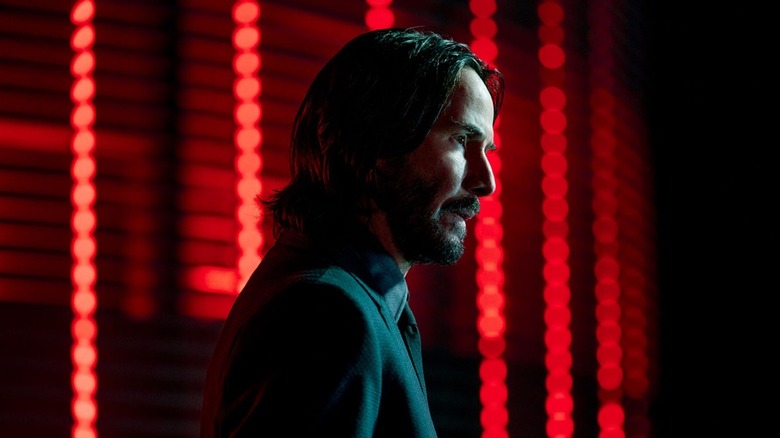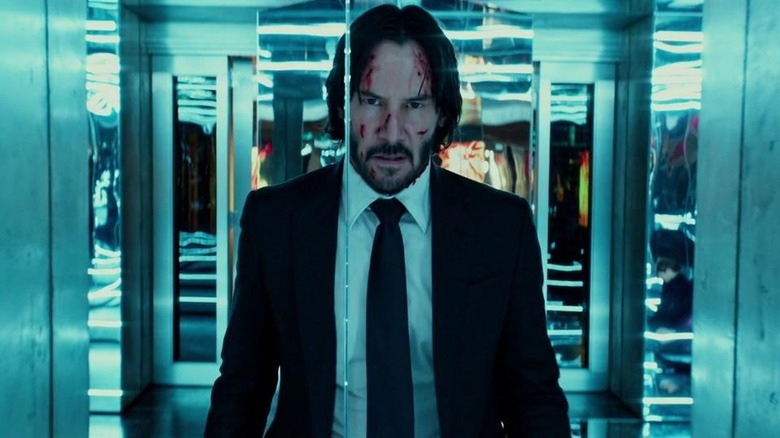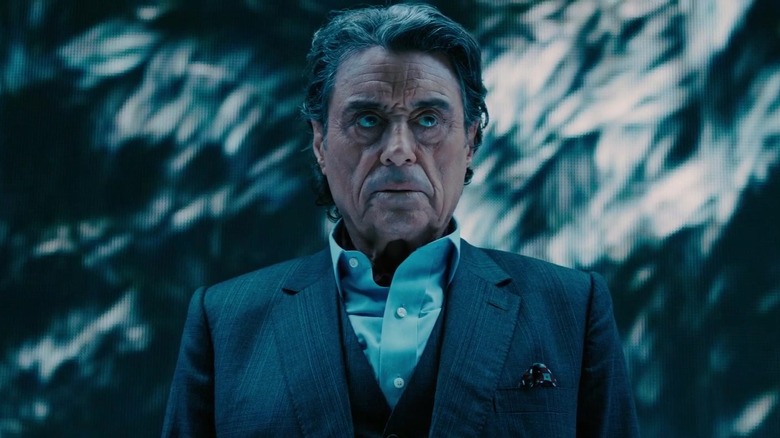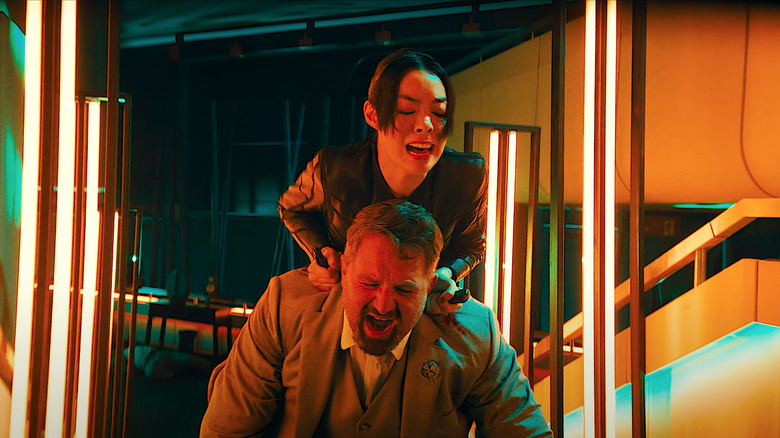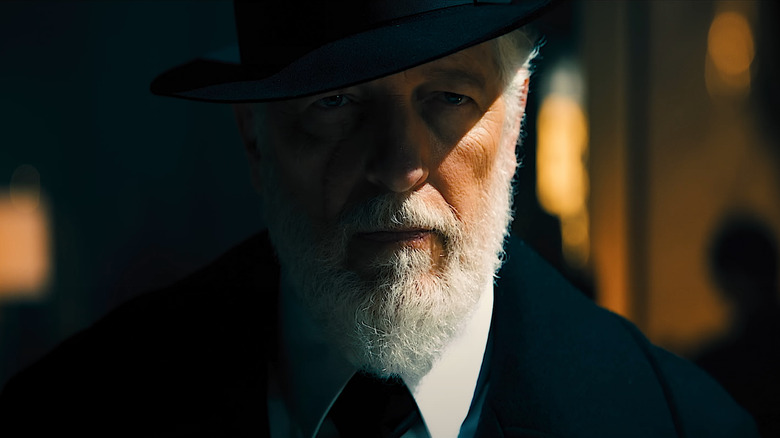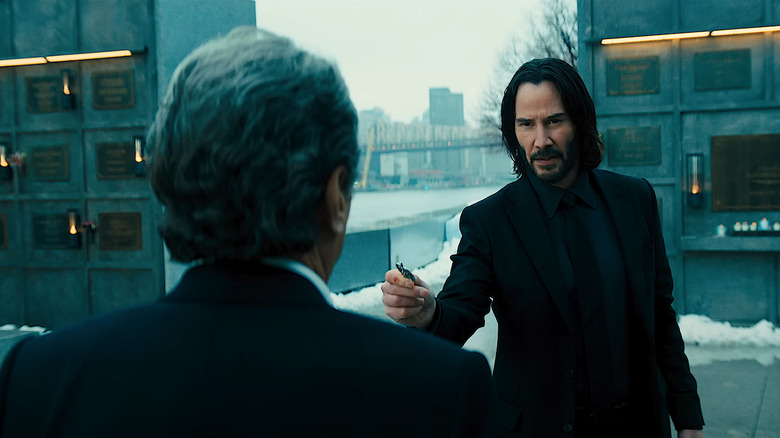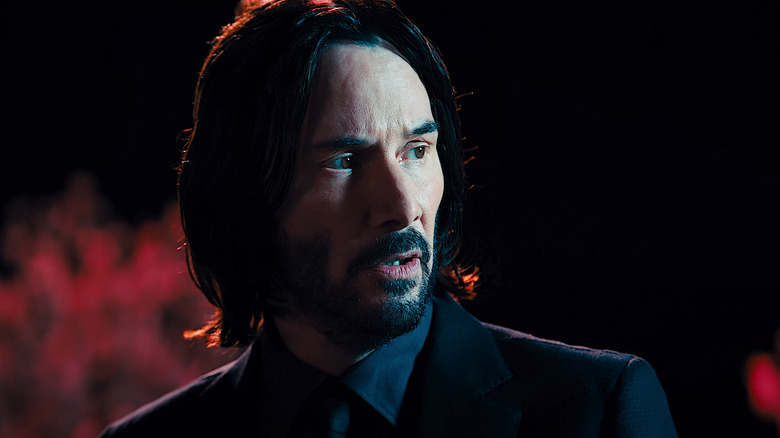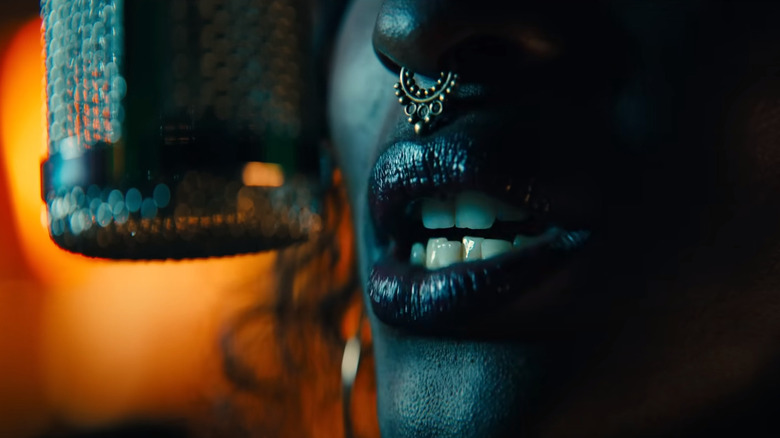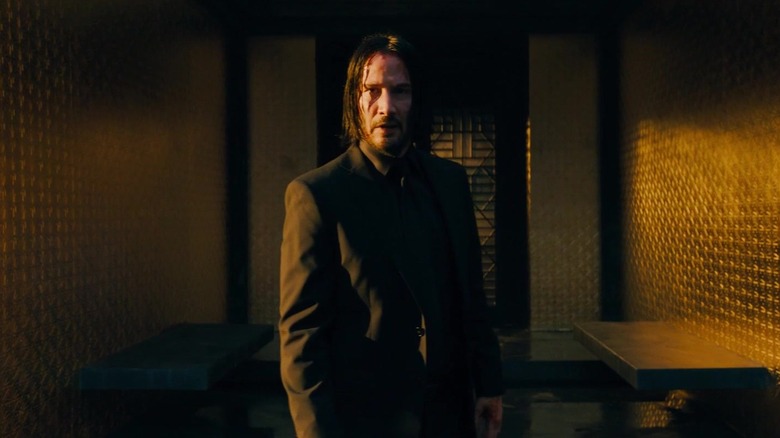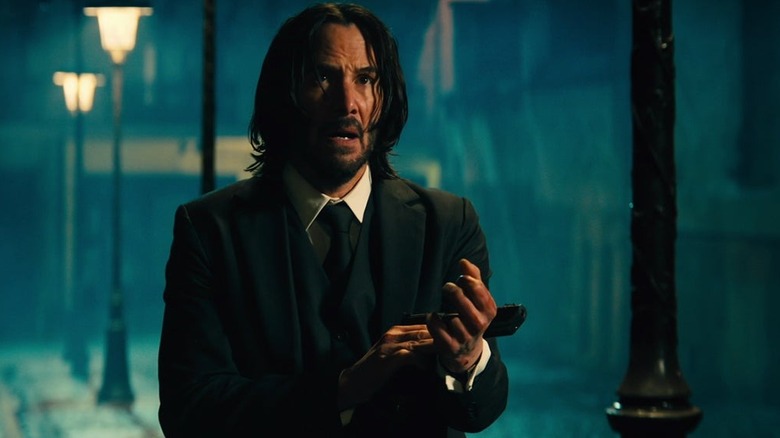Biggest Unanswered Questions In John Wick: Chapter 4
This post contains spoilers for "John Wick: Chapter 4"
"John Wick: Chapter 4," starring Keanu Reeves, is an action-packed neo-noir, and — as the title suggests — it's the fourth film entry in the popular "John Wick" franchise. It's also possibly the final one for a while, according to director Chad Stahelski. The series follows Reeves as the eponymous John Wick, who in the first film is a retired assassin roped back into his old life after thugs kill the cute dog given to him by his now-dead wife. The sequels follow Wick dealing with the increasingly labyrinthine politics of the vast secret underground world of killers he inhabits — all with its own special currency, lingo, and customs — which is controlled by the seemingly omnipotent "High Table."
In "John Wick: Chapter 4," John has been on a bloody rampage against the powerful High Table — and it's making them very nervous. So they promote the vile Marquis Vincent de Gramont (Bill Skarsgård), who forces the sympathetic blind hitman — and Wick's former friend — Caine (Donnie Yen) to take John down. Violent and well-choreographed action sequences ensue.
However, once the bullets are emptied and the smoke clears, the audience is left with a surprising number of questions by the end of the film. This includes some bizarre choices made by the characters, intriguing untold backstories behind others, and what John's actual endurance for pain really is.
Is John Wick actually dead?
As surprising as it may seem — especially for a franchise as successful and lucrative as the "John Wick" series is (with each successive film making more than the last) – John Wick apparently dies at the end of "John Wick: Chapter 4." After Wick refuses to shoot his old friend Caine in a duel — both to protect Caine's daughter (Aimée Kwan), whose survival depends on Caine killing John, and to take out the arrogant Marquis Vincent de Gramont — Caine's bullet hits Wick in a vital organ. Though the wound doesn't kill John immediately (in fact, Wick not firing at Caine allows him to shoot the Marquis in the head), it's clearly the final blow to John as he also succumbs to the many other injuries that he had accrued across the rest of the film as well. We then cut to the Bowery King (Lawrence Fishburne) and Winston (Ian McShane) looking over John's tombstone, laid to rest next to the grave of his wife, Helen (Bridget Moynahan).
But is John actually dead? Because the thing is, we don't see him being buried. Furthermore, Winston could've helped set up a fake tombstone to let John finally live for himself — using the Bowery King as a legitimate witness. Maybe his "goodbye" is knowing that John wouldn't be able to see him again.
To be fair, we're hoping Wick gets to find peace one way or another. It makes sense narratively and thematically to kill him off finally, and frankly, more franchises could use definitive endings. But then again, Hollywood rarely lets a profitable franchise rest for long.
Winston is possibly John Wick's father
As mentioned in the previous entry, at the end of "John Wick: Chapter 4," right before the ending credits roll, we see the Bowery King and Winston looking over John's and Helen Wick's gravestones and giving their condolences under a moody, cloudy sky. Before leaving, however, Winston puts his hand lovingly on John's gravestone, tearfully stating "goodbye, my son," while showcasing a tattoo of John's (adopted) family crest on his finger.
Now, this brings up some interesting inquiries, especially considering the shot of the tattoo is pretty much the penultimate shot of the entire film. Does this mean that Winston was actually John Wick's biological father?
Winston and John's being related by blood seems highly unlikely. For one, John is canonically an orphan, but there's nothing saying that Winston had given up John in the past. Though it's honestly more likely that Winston simply saw John as more of an adopted son rather than just another faceless assassin. Perhaps Winston even raised John — which, if so, could be a subplot for the upcoming "John Wick" spin-off series "The Continental," which will stream on Peacock and star actor Colin Woodell of "The Flight Attendant" fame as a young Winston. While it's canon that John was raised in Berlin by the Ruska Roma, since Winston's tattoo is of the same crest, he could've been there in the past as well. However, it is most likely Winston saying "goodbye, my son" was just a sign of respect and mourning — but John's mysterious parentage is still intriguing to think about nonetheless.
Does Akira actually kill Caine at the end?
The Marvel Cinematic Universe has had a profound and lasting effect on Hollywood — for better and worse. One of those things that it has helped popularize — in pretty much every genre at this point (including horror films, as seen by "Scream VI") — is the inclusion of a post-credits scene. Now, obviously the MCU didn't invent the after-credits sequence (that would arguably be 1966's "The Silencers"), and there were other famous examples before 2008's "Iron Man" (such as 1986's "Ferris Bueller's Day Off") — but Marvel have certainly helped popularize their inclusion regardless.
After the credits roll on "John Wick: Chapter 4," we see Caine about to be reunited with his long-lost daughter — since John Wick's (apparent) sacrifice during their climatic duel led to the High Table sparing Caine's and Caine's daughter's lives. However, earlier in the film, while Caine was still chasing Wick down, Caine got into a deadly sword fight with another one of Wick and Caine's old allies — the manager of the Osaka Continental Hotel, Shimazu Koji (Hiroyuki Sanada) — and Caine ended up killing Koji in front of his daughter, Akira (Rina Sawayama). Thus, before Caine can reach his daughter, Akira rushes in to attack Caine with a knife.
We don't see the fight itself (the scene cuts before that happens), so the question remains — did she fight and kill him? Or will something or someone intervene? Is she or Caine the new face of the "John Wick" franchise? Only time will tell.
Who exactly is the Harbinger?
One of the main appeals of the "John Wick" series — besides its crazy action, stunts, and surprisingly intricate lore and world-building — is the fact that the cast is always full of great actors playing the colorful and eccentric assassins that John encounters, both as friend or foe. This includes Willem Dafoe, Halle Berry, Anjelica Huston, and Lawrence Fishburne. And "John Wick: Chapter 4" is no exception. Besides Hong Kong legend Donnie Yen and current horror icon Bill Skarsgård, the sequel also introduces the Harbinger, played with intriguing intensity by Clancy Brown ("Highlander").
What's interesting about the Harbinger, besides Brown himself, is that one of the first things we see of him is his finger's been cut off — similar to what happened to John Wick in the previous film, "John Wick: Chapter 3 — Parabellum." In that film, Wick cuts off his finger to create a blood oath for the High Table and be free of the bounty on his head. He was also supposed to kill Winston — which he ultimately refused to do. But is Brown's Harbinger someone who did fulfill his oath to the High Table? Maybe that's why he's so obsessed with the rules — especially "the old ways" — and often talks back to his apparent superior, the corrupt Marquis. Because of this detail, it seems like the Harbinger is a foil for John — his path seems like a route John might've taken had he not left the assassin lifestyle behind. This might even be why the Harbinger is ultimately sympathetic to Wick's plight — he sees himself in him.
Why didn't John Wick try to kill Winston upon first meeting?
At the end of the previous film, Winston betrays John, who had just risked his life to protect Winston and his hotel against an army of highly trained, armor-wearing High Table gunmen. Nonetheless, after all is said and done, Winston takes out a small pistol and shoots John in the chest, knocking John off a high rooftop — presumably to his death. This is because the Adjudicator (Asia Kate Dillon) had deconsecrated Winston's hotel. They gave Winston the choice to get his hotel back if he killed John first. Luckily for Wick, despite the gunshot to the chest and falling multiple stories off a rooftop, he miraculously survives. He's resuscitated by the Bowery King (who had also been previously punished by the Adjudicator for disobedience).
However, when John meets Winston again in "John Wick: Chapter 4," there seems to not be too much bad blood — outside of some oblique references to the past film and Wick commenting that Winston "always has an angle." John even trusts Winston enough to agree to his plan to set up a one-on-one duel with the Marquis Vincent de Gramont to escape the High Table (and "coincidentally" get the Continental back).
Now, sure, there's some bond between the two — and maybe even some understanding from John about the tough situation Winston was in — but it makes little sense why he wouldn't be angrier, and possibly vengeful, about Winston's act of betrayal.
How does John travel the world safely without being detected?
"John Wick: Chapter 4," like most of the other films in the series, is a fun (albeit extremely violent) globe-trotting adventure. Wick travels from New York to the Middle East to Japan to Berlin to Paris and so on — all in an effort to escape the High Table and kill a bunch of people (usually those who work for the High Table in some capacity).
The problem is, the High Table — as has been shown in multiple films at this point in the franchise — is seemingly nigh-omnipresent and incredibly wealthy and well-connected. It seems extremely unlikely that Wick could easily board a transcontinental plane or ship without being clocked immediately, or at least it wouldn't be so easy that he could do it multiple times throughout the film without any trouble. We're aware Wick is a highly trained assassin — but that's because he's extremely proficient at fighting, marksmanship, and using improvised weapons. Essentially, he's amazing because of his prowess at killing — not his use of disguises, deception, or subterfuge. In fact, like James Bond, he's always pretty easily recognized by fellow assassins, despite that presumably being a pretty debilitating occupational hazard.
Plus, airports are awash in surveillance and security measures. Even if Wick has the requisite fake passports and such, the "John Wick" series has shown time and time again that assassins are everywhere — and furthermore, that their tech and resources rival that of world governments.
Is the radio station open to the public, or only for hitmen?
Toward the end of "John Wick: Chapter 4," before the climatic dual between Wick and Caine, there is an extended action scene that pits John against a throng of thugs throughout Paris. This includes a car chase where Wick drives a door-less muscle car, engages in a fistfight during the middle of high-speed traffic at the Arc de Triomphe, and a minutes-long, continuous overhead shot of John Wick blowing away thugs with a makeshift rocket launcher in an abandoned building. In fact, John encounters the most baddies at once in the entire film during this section — and that's because the Marquis had orchestrated for a radio station to send a broadcast out to all the assassins in Paris about the incredible bounty on John's head. The radio station itself is situated in the Eiffel Tower, with a DJ somehow keeping tabs on Wick's whereabouts throughout the fight.
This does beg the question, is this an assassins-only broadcast? Or is it something a random person could tune into if their antenna got the right frequency?
While it's safe to assume the station is only for assassins (somehow), that isn't ever made explicitly clear in the film. Heck, there's even the possibility it normally is a standard popular radio station that is just sometimes forced to do the bidding for the High Table from time to time. The organization certainly has its hands in many pies, after all.
How does John Wick survive — and keep fighting — after so many falls?
John Wick is best known for his prowess at killing. He literally spends most of the series' runtime killing countless goons and other highly trained assassins with ease. The only thing that gives away his humanity is that he sometimes seems a bit winded afterward, with a few bloody (though still aesthetically appealing) scratches on his face. And that's all well and good, of course. After all, that's why we go to movies like "John Wick" — to see badasses be badasses and kill people in increasingly violent and clever ways. However, films — even over-the-top action films — need a sense of stakes. How is it, then, that John Wick can survive so many multi-story falls from buildings?
It's not even one time either. You could chalk up his survival in "John Wick: Chapter 3 — Parabellum" as dumb luck and perseverance, but it happens multiple times in "John Wick: Chapter 4." More egregiously, many thugs die in similar ways — often with heights that seem less severe than what John survives. We don't mind when this happens to say, Batman or a "Looney Tunes" character, because surviving great falls makes sense for them. It's not so easy to brush off, though, in the "John Wick" series, where gunshots, stab wounds, and car crashes all do real damage. The only way it'd make sense is if Wick turns out to have superpowers ... or is secretly a cartoon after all.
How come there's no pushback from bullets to kevlar suits?
The "John Wick" films obviously aren't going for realism. And again, that's fine. First and foremost, these are over-the-top action films, where one man can take on seemingly hundreds of goons and only get slightly winded by the end of it. Audiences are always going to be expected to suspend their disbelief to enjoy a film like this. In fact, one of the influences of "John Wick" — among many — is the suave spy flick, where suspension of disbelief is equally paramount. This is why we see John wear a cool suit, practice all manner of martial arts, and use specialized tech. In this case, his tech includes his seemingly impenetrable black kevlar suit jacket.
Now, it's fun action-movie logic that a slick, tailored suit can be made of kevlar and be lithe and mobile to begin with — which is obviously ridiculous — but suspension of disbelief and all that. However, why doesn't it still have recoil and blunt force trauma from bullet hits — which real kevlar does, especially with how thin the suit itself is. It would also — on a stunt and narrative level — make the fights more interesting if it didn't feel that John had practically a force-field protecting him in every fight. The shoot-out scenes are still awesome and fun, don't get us wrong, but the film does lose a sense of danger in many of the fights. Still, for all our complaints about the kevlar suit, Reeves makes it look good.
Does John meet his wife again in the afterlife?
"John Wick: Chapter 4" isn't really a spiritual or supernatural film, and neither were any of the other films in the series. In fact, at one point, while Caine and Wick both reminisce in a church before their duel at the Basilica of Sacré Coeur de Montmartre, Caine asks John, "Do you think your wife can hear you?" John responds, "No." To be fair, Wick does ponder for a moment if he might be wrong, but regardless, he's far from a believer.
So it's surprising at the end that while John slumps on the steps of the Sacré Coeur, bleeding to death from his multiple injuries and Caine's bullet, he sees visions of his wife, Helen. And given all the religious imagery throughout the film — such as the final duel happening at the aforementioned Sacré Coeur church — and all the religious language the assassin underworld speaks throughout the franchise (i.e. "consecrate," "excommunicado," etc.), it seems like there could be a religious connotation to Wick's death after all. By sacrificing his life to save Caine's daughter, he is absolved of his past sins to live in eternity with his beloved.
Now, the most likely (and preferable) answer for these intercut scenes of his wife is that John's just remembering her. They're simply the last things John is thinking about as he finally dies and his brain synapses rapidly fire before death. But who can say?
